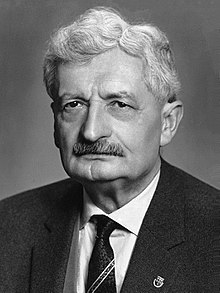Hermann Oberth
| Hermann Oberth | |
|---|---|
 |
|
| Born | Hermann Julius Oberth 25 June 1894 Hermannstadt (Nagyszeben), Austro-Hungarian Empire (today Sibiu, Romania) |
| Died |
28 December 1989 (age 95) Nuremberg, West Germany |
| Citizenship | Hungarian, German |
| Nationality | German |
| Fields | Astronautics and physics |
| Alma mater | University of Cluj |
| Doctoral advisor | Augustin Maior |
| Notable awards | Wilhelm Exner Medal, 1969 |
Hermann Julius Oberth (German pronunciation: ['hɛrman 'ju:lɪʊs 'o:bɐt]; 25 June 1894 – 28 December 1989) was an Austro-Hungarian-born German physicist and engineer. He is considered one of the founding fathers of rocketry and astronautics.
Oberth was born to a Transylvanian Saxon family in Hermannstadt (Nagyszeben), Austria-Hungary, today Sibiu in Romania. At the age of 11 years, Oberth became fascinated with the field in which he was to make his mark through reading the writings of Jules Verne, especially From the Earth to the Moon and Around the Moon, re-reading them to the point of memorization. Influenced by Verne's books and ideas, Oberth constructed his first model rocket as a school student at the age of 14. In his youthful experiments, he arrived independently at the concept of the multistage rocket, but he lacked then the resources to pursue his idea on any but a pencil-and-paper level.
In 1912, Oberth began the study of medicine in Munich, Germany, but at the outbreak of World War I, he was drafted into the Imperial German Army, assigned to an infantry battalion, and sent to the Eastern Front against Russia. In 1915, Oberth was moved into a medical unit at a hospital in Sighișoara (German Schäßburg, Hungarian Segesvár), Transylvania, in Austria-Hungary (today Romania). There he found the spare time to conduct a series of experiments concerning weightlessness, and later resumed his rocketry designs. By 1917, he showed designs of a missile using liquid propellant with a range of 180 miles to Hermann von Stein, the Prussian Minister of War.
...
Wikipedia
